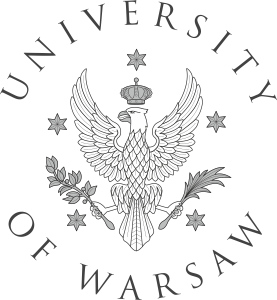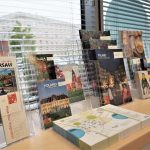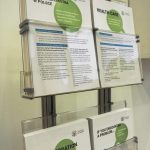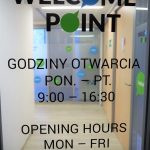30 listopada 2020
The Centre of New Technologies invites to a webinar by
Prof. Izabela Sitkiewicz,
director of the Population Diagnostics Center, Łukasiewicz Research Network – Polish Center for Technology Development, Wrocław
Title: Streptococcus anginosus – an unrecognized pathogen
Date: 4th December 2020 (Friday)
Time: 12:00 pm (Central European Time)
Host: prof. Joanna Trylska
Virtual seminar: https://us02web.zoom.us/j/81606321837
CeNT-UW-Webinars-instruction-for-attendees
24 listopada 2020
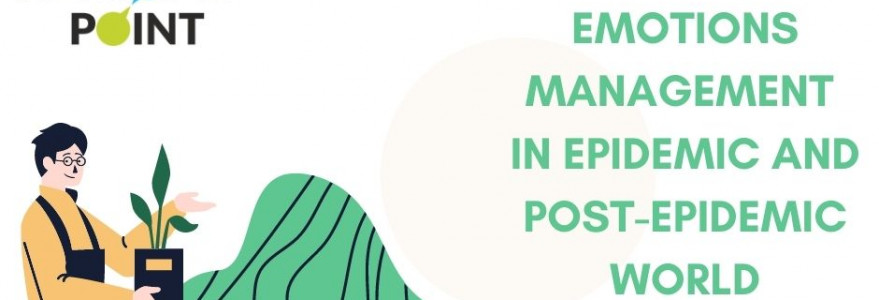
The COVID-19 pandemic may be overwhelming and cause strong emotions in us. Dr Dorota Kobylińska from the UW Faculty of Psychology will lead workshops for long-term international students entitled “Emotions management in an epidemic and post-epidemic world”. The event will take place on 10th-11th December, in an online format. Application deadline: 26th November.
Long-term students who study at the University of Warsaw can participate in online workshops, organised by the UW Welcome Point, and find out about strategies for regulating emotions, and ways of how to experience positive emotions more often through Polish culture.
The workshops are dedicated to:
- 2nd and 3rd-year students of the 1st cycle (Bachelor’s degree)
- 4th and 5th-year students of uniform Master studies
- students of the 2nd cycle (Master’s degree)
To register for the course, please fill in the form >>
Please apply by 26th November. The workshops will be held on 10th -11th December, 10:00 a.m.–1:15 p.m.
More information is available on the Welcome Point website >>
Source: www.en.uw.edu.pl
23 listopada 2020
The Centre of New Technologies invites to a webinar by
Prof. Jan Brezovsky,
Faculty of Biology, Adam Mickiewicz University in Poznań and the International Institute of Molecular and Cell Biology in Warsaw,
Title: Ligand-transport pathways in proteins: structure, dynamics, function & modulation
Date: 27th November 2020 (Friday)
Time: 12:00 pm (Central European Time)
Host: prof. Joanna Trylska
Virtual seminar: https://us02web.zoom.us/j/83089886457
CeNT-UW-Webinars-instruction-for-attendees
Abstract: https://labbit.eu/
Enzymes are indispensable for the function of every living cell, catalyzing the efficient execution of a vast number of concurrent chemical reactions. These reactions take place in the enzymes’ active sites exposed on the protein surface or, very frequently, buried deep inside its core. Access of substrates and release of reaction products via molecular tunnels is essential for the function of the buried sites. Aside from enabling efficient catalysis, tunnels also constitute a structural basis of various regulatory mechanisms that are critical to the living cell like substrate inhibition and cooperativity. Despite their utmost importance, tunnels are rarely explicitly considered in protein research due to obtrusive challenges in their identification arising from their often fleeting nature. The ensuing knowledge gap precludes linking tunnel mutations to pathologies, targeting the ligand-transport process with tunnel inhibitors, and designing proficient enzymes with the buried active sites.
In this talk, we will review challenges connected with uncovering transient tunnels, their engineering, and functional impacts on enzyme function, and briefly outline future steps to be taken in order to narrow the knowledge gap to deliver necessary insights relevant to enzymology, precision medicine, drug discovery, and protein engineering.
18 listopada 2020
On 8 December at 15:00 SUNERGY will organize its first Industrial Webinar: Energy carriers and approaches towards a closed carbon-cycle. SUNERGY Industry Board members Maximilian Fleischer (Siemens Energy), Anastasios Perimenis (CO2 Value Europe) and Jan Mertens (Engie) will talk about energy carriers, including carbon-based ones, and give an overview about the technologies needed, energy transport and carbon capture and utilisation (CCU) strategies.
Their talks will provide a general overview of the challenges European companies are facing towards climate-neutrality and how SUNERGY initiative could help contributing with different approaches.
You can find more information and register for this webinar here. If you would like to invite colleagues via e-mail or social media you could use one of the suggested messages in the promotional kit.
If you have any questions, please do not hesitate to reach out to SUNERGY via contact@sunergy-initiative.eu
17 listopada 2020
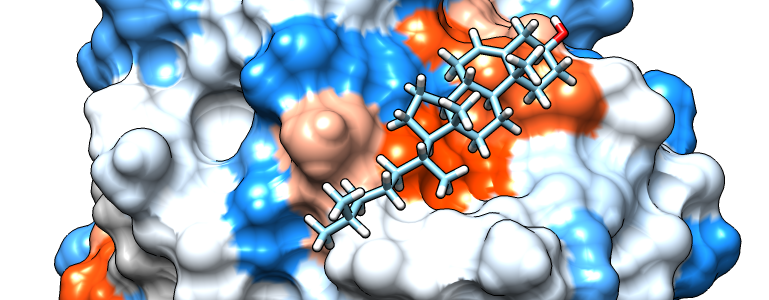
Obesity is a risk factor for diseases such as type II diabetes, heart disease and fatty liver disease. An international research team, to which researchers from the UW Faculty of Chemistry belong, identified a new factor that offers a potential new therapeutic strategy for obesity. Their study has now been published in the prestigious journal “Nature Metabolism”.
According to the World Health Organisation, obesity has reached epidemic proportions globally, with at least 2.8 million people dying each year as a result of being overweight or obese. A central element in the development of obesity is adipose tissue, which comprises fat cells (so-called adipocytes, specialised to store fat) and macrophages (immune system scavenger cells, which are typically associated with the destruction of microbes).
Scientists from Austria, together with researchers from Germany and Australia, and a team of scientists from the University of Warsaw have discovered the signalling pathways responsible for the development of a valuable type of adipose tissue macrophage (ATM) in obesity, which prevents lipotoxicity. Lipotoxicity is the process whereby fat molecules are deposited in non-adipose tissues.
Like Dr. Jekyll and Mr. Hyde
The researchers working at the UW Faculty of Chemistry: Dr. Maria Górna, Dr. Marta Kulik and Prof. Paulina Dominiak, specifically studied the PI3K signalling pathway. This is a major metabolic regulator, since it regulates fat storage and plays a major role in the cellular reaction to the hormone insulin. In obesity, diminished insulin action or insulin resistance leads to type II diabetes, which is linked to high blood glucose levels.
Dr. Gernot Schabbauer from the Institute of Vascular Biology and Thrombosis Research at MedUni Vienna’s Center for Physiology and Pharmacology has been studying the PI3K signalling pathway in immune cells for several years. “The key role of PI3K in metabolic processes is proven but its role in adipose tissue macrophages was hitherto unclear,” stresses Dr. Schabbauer.
“ATMs are like Dr Jekyll and Mr Hyde – in obesity, they can either be good or bad. We assumed that an active PI3K signalling pathway could tip the balance in favour of ‘good’,” adds Julia Brunner, co-lead of the study.
Using techniques such as multicolour flow cytometry, lipidomics, cellular respiration tests and several animal models, the scientists discovered that sustained activity of the PI3K signalling pathway can tip the balance within macrophages for the better: this notably produces specialised ATMs, which are characterised by increased numbers of MARCO (macrophage receptor with collagenous structure) scavenger receptors on their surface.
Scavenger receptor
“We discovered that these MARCO-expressing ATMs are professional lipid scavengers. These cells absorb fat MARCO-dependently and break it down, thereby preventing it from finding its way into the bloodstream,” explains Andrea Vogel, co-lead author of the study and doctoral candidate in immunology at MedUni Vienna. Omar Sharif, a co-senior author of the study, adds: “Metabolic syndrome and lipotoxicity are characteristic features of obesity. Our work indicates that a higher lipid intake and improved energy metabolism of the ATMs helps to maintain systemic metabolic health. This can have far-reaching impacts for a number of metabolic diseases.”
The researchers from the University of Warsaw analysed the structure of MARCO and assessed its potential for lipid binding. “It is a receptor known for binding and cleaning up as diverse objects as bacteria or oxidized Low-density lipoprotein, but its role in buffering lipids is new”, says Maria Górna. “This study is only the beginning of our collaboration with colleagues from Austria, and we have ideas on how to next test the direct involvement of MARCO in lipid uptake.”
Subsequent studies will now be conducted to establish whether PI3K signalling can also have a lasting influence on the ATM population in humans.
Source: www.en.uw.edu.pl
13 listopada 2020
The Centre of New Technologies invites to a webinar by
Prof. Syma Khalid,
School of Chemistry, University of Southampton
Title: Computational Microbiology of the E. coli Cell Envelope
Date: 20th November 2020 (Friday)
Time: 12:00 pm (Central European Time)
Host: prof. Joanna Trylska
Virtual seminar: https://us02web.zoom.us/j/88907066384
CeNT-UW-Webinars-instruction-for-attendees
Abstract: https://symakhalidresearchgroup.wordpress.com/syma-khalid-group-leader/
10 listopada 2020
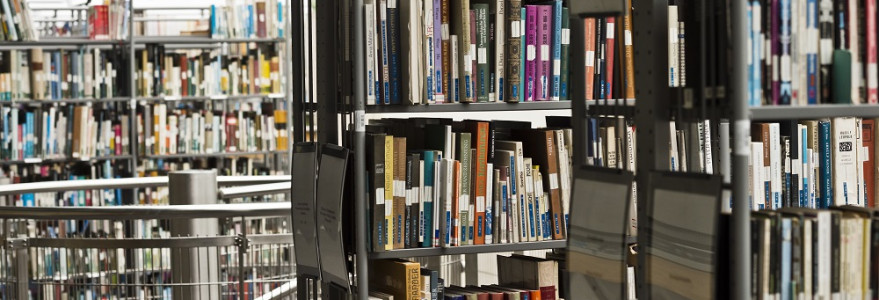
The University of Warsaw Library (BUW) remains closed until 29th November due to the restriction on the operation of public and scientific libraries introduced by Poland’s Council of Ministers.
Those who borrowed books can return them later.The return dates for borrowed books, Kindle readers and keys to individual work booths have been postponed to 15th December. There will be no charges for books overdue from 7th to 29th November.
Books ordered earlier than 7th November and reservations ready for pick-up, can be collected by 4th December (it applies to the Circulation Desk and the Reading Room).
The possibility of ordering books from BUW as well as requesting keys to the individual work booths have been disabled, but they can still be booked.
Students, doctoral candidates and employees of UW can still order scans for free. Scanning service is available for users with active library accounts at the University of Warsaw Library, with no overdue library (BUW) materials, and with no fees charged by the University of Warsaw Library. More information >>
Also, it is still possible to use to the wide range of electronic resources of BUW: e-journals, e-books and databases. More information>>
Źródło: www.en.uw.edu.pl

On 17th November, Welcome Point is organising an online meeting with the Association for Legal Intervention on crimes motivated by prejudice.
The programme of the event includes the following parts:
- A 45- minute presentation about bias crimes, rights and obligations of a victim, and situations when the police are obliged to act,
- A 20-minute practical exercise on descriptions of specific behaviours: Is this a crime?
- Participants’ questions (25 minutes).
The meeting will be held on 17th November at 1.30 pm.
To participate, please fill in the registration form >>
Registration will be open until 12th November. To learn more, visit the Welcome Point website: www.welcome.uw.edu.pl.
Source: www.en.uw.edu.pl
PostDoc position is available in Grela’s group from the FNP TEAM-TECH programme „Catalysis for the Twenty-First Century Chemical Industry”. Project leader: prof. dr hab. eng. Karol Grela. Deadline for applications: 10 December 2020. For more info see >> pdf
06 listopada 2020
Welcome Point is an information point where everyone can get help and information during their stay at the University of Warsaw. There are two locations of this unit. First WP office is available on the main campus, and the second one operates on the campus in Ochota.
The new Welcome Point was open on the campus in Ochota district two weeks ago. Students from Russia, Armenia, India, Thailand and Ukraine, who get education at UW, visited it seeking help and guidance. They were interested in finding information on, e.g. library services under pandemic restrictions, scholarships, students’ union, dormitories and the procedures regarding registration for classes and lectures.
Incoming students are welcome with small gifts, including student packs and tourist information regarding our university, Warsaw and Poland. The new spot in Ochota facilitates access to information and advice for exact and natural sciences students and those who live in dormitories at Żwirki i Wigury Street.
“I am glad that Welcome Point is also on the campus in Ochota now. We can complete all the formalities related to, e.g. the employment of international scientists much faster and more efficiently, and above all, here, on the spot. We can save a lot of time,” says Professor Ryszard Kutner, who invited a visiting lecturer Dr. Zbigniew Struzik to the UW Faculty of Physics (It was possible thanks to the University’s Integrated Development Programme (ZIP).
Welcome Point remains open for visitors who follow precautionary measures on:
- wearing a mask,
- keeping a safe distance from other people (2 meters),
- using hand sanitizers.
Due to a dynamic situation, the Welcome Point team asks to make an appointment by e-mail before visiting the office. All the matters which do not require in-person contact should be handled by e-mail or by sending a message on the Welcome group on Facebook.
The new spot of Welcome Point is situated on the ground floor of the CeNT building (on the campus in Ochota district), open from Monday to Friday, 9:00 am – 4:30 pm.
Source: www.en.uw.edu.pl

